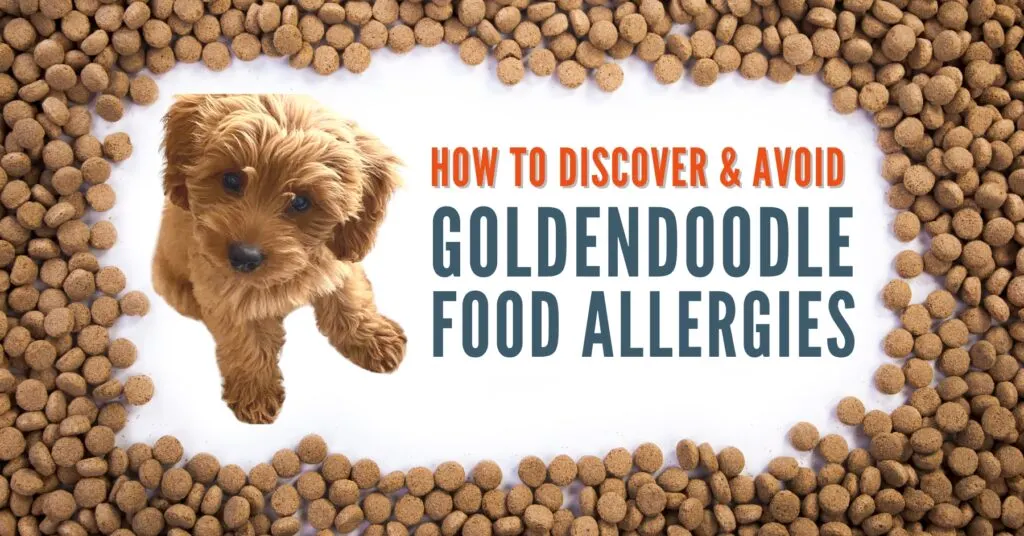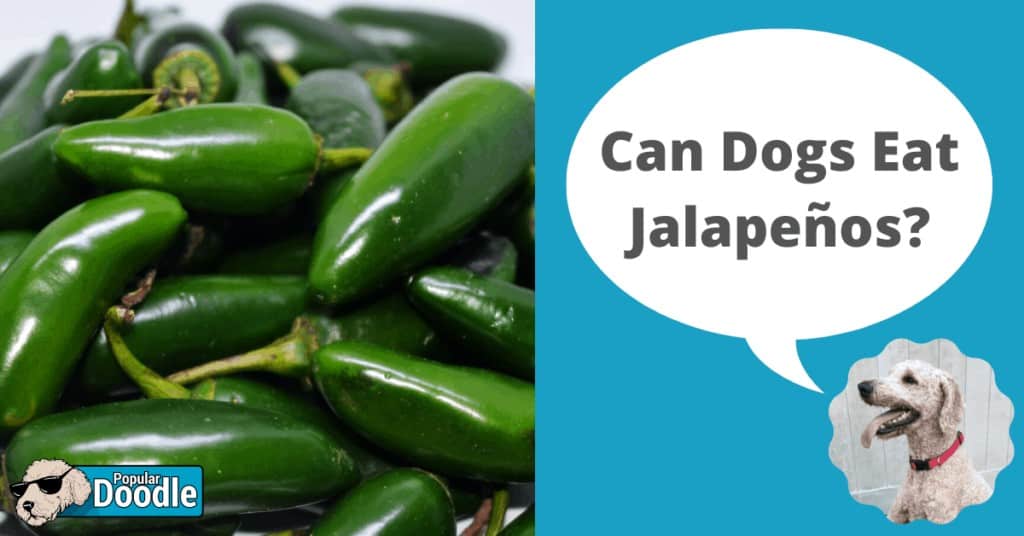By Dr. Merliza Cabriles, D.V.M.

Navigating food allergies is a part of daily life for many of us. However, dog owners often don’t realize that their pets can have the same sensitivities to various foods.
Goldendoodles are particularly prone to food allergies compared to other dogs, thanks to genetics from both their parent breeds. Data from Colorado State University shows that Golden Retrievers may be at greater risk of developing food allergies than other breeds of dogs. Some experts believe that Poodles might also be at greater risk of food allergies.
The most common Goldendoodle food allergies are wheat, grains, dairy, beef, eggs, soy, lamb, and chicken. These foods make up over 90% of food allergy cases in Goldendoodles, but other less common triggers include soy, corn, egg, pork, fish, rice, barley, rabbit, kidney beans, and tomatoes.
Keep reading to learn if your Goldendoodle is suffering from food allergies, how to narrow down which foods may be the culprits, and what you can do to help them!
Common Goldendoodle Food Allergies
Goldendoodle allergies occur when a dog’s immune system has a hypersensitive reaction to a particular allergen leading to the production of antibodies. Foods are just one category of allergens and comprise 10% of all dog allergy cases.
Virtually any food or ingredient in dog food can produce an allergy. In a recent study on common food allergen sources in dogs and cats, the most frequently reported food allergens involved in cutaneous adverse food reactions (CAFRs) in dogs include the following:
- Beef (34%)
- Dairy Products (17%)
- Chicken (15%)
- Lamb (14.5%)
- Wheat (13%)
Other less common triggers of food allergies in dogs include soy, corn, egg, pork, fish, rice, barley, rabbit, kidney beans, and even tomatoes.
When considering which food items your Goldendoodle may be allergic to, remember that most dogs with food allergies are hypersensitive to more than one allergen. Additionally, being on the same brand or type of dog food for a long time is an important predisposing factor for Goldendoodle food allergies.
Here is more information on many of the most common food sensitivities your pup may be suffering from…
Proteins
As you can see from the list above, animal proteins are the most common food allergens for dogs. There’s nothing particularly special about these ingredients other than they are among the most common major ingredients in dog food.
The top protein triggers of Goldendoodle food allergies include the following:
- Beef – This is a very common ingredient in dog food products. If your Goldendoodle has been on the same beef-based diet for a long time, the chance of developing a food allergy is higher.
- Lamb – Like any meat-based ingredient in pet food, lamb contains specific protein allergens that can trigger food allergies in Goldendoodles.
- Chicken – This meat contains allergens that can trigger overreactions in hypersensitive dogs. One study identified seven major chicken allergens for dogs.
- Dairy Products – Some dogs are lactose intolerant. This problem, however, is not considered a “true food allergy” but rather a type of food intolerance. Often, it can be tricky to distinguish between a true dairy allergy and lactose intolerance. But there’s one tell-tale difference—a Goldendoodle with a dairy allergy may exhibit skin itching or related symptoms, while lactose intolerance is mainly about digestive upsets and disturbances.
Grains (Wheat) and Other Carbohydrate Sources
Some Goldendoodles have a wheat-based food allergy, while some have an allergic reaction after coming in contact with wheat. The latter often happens when the dog lives in an environment (such as a wheat farm) where they are exposed to wheat-based airborne allergens.
Many commercial dog food products contain high quantities of carbohydrates. Heating proteins at high temperatures in the presence of carbohydrates has been shown to induce the formation of protein aggregates resistant to digestion and increase the allergenic potential of the food.
Processing may also change the allergenic properties of proteins in pet food. Wheat and soy only induce allergic reactions after cooking, extended storage, or heating.
Related: Should Goldendoodles Eat Grain Free? (Veterinarian Advice)
Food Allergies vs. Food Intolerance
Many Goldendoodle owners think that a “food allergy” and a “food intolerance” refer to the same thing. But that is far from the truth!
The immune system plays an essential role in pet food allergies. The symptoms are brought about by the adverse response of the immune system to a specific substance.
The allergen in the diet usually escapes the digestion process and is absorbed intact through a compromised gastrointestinal tract (such as when a dog has a ‘leaky gut’). Once they reach the bloodstream, these allergens are detected by the immune system, triggering a cascade of reactions that lead to the production of specific antibodies and manifestations of allergy symptoms.
On the other hand, pet food intolerance is just an abnormal, localized response to something that the dog has eaten. The adverse reaction doesn’t involve the immune system, and symptoms are usually exhibited after eating some foods.
Dogs with specific digestive enzyme deficiencies also have higher risks of food intolerance. The usual symptoms include gastrointestinal disturbances, such as stomach pain, bloat, gassiness/flatulence, diarrhea, and skin rashes.
Both food allergies and food intolerance are considered important causes of cutaneous adverse food reactions (CAFRs).
Signs of Goldendoodle Food Allergies
There are two types of Goldendoodle allergy reactions…
- Immediate Reaction – This can occur within a few minutes to a few hours after your Goldendoodle’s exposure to the antigen (allergen). In medical terms, this is referred to as an IgE-mediated reaction.
- Delayed Reaction – This type of allergic reaction tends to occur within one to five days after the dog’s initial contact with the antigen (allergen). It’s called a non-IgE-mediated immune response.
The most common symptoms of Goldendoodle food allergies include the following:
- Itching – Your Goldendoodle may persistently scratch, chew, and lick itchy body parts, including the face, ears, paws, limbs, and belly. Some experts refer to the food allergy symptom pattern as “ears and rears, ” indicating ear infections coupled with an itchy rear end.
- Chronic Diarrhea or Loose Stools
- Gas or Flatulence
- Chronic Ear Infections (Otitis Externa) – The Goldendoodle’s ear flap may appear reddish and inflamed. Affected dogs are prone to developing secondary yeast/bacterial ear infections.
While the risk of anaphylaxis (a severe, potentially life-threatening allergic reaction) in food allergies can occur, it is very rare and extreme.
Is It a True Goldendoodle Food Allergy?
There is no simple test to diagnose true food allergy in dogs. The symptoms often overlap with other types of allergies. In many cases, several types of allergies are frequently concurrent in the same dog.
Here are several clues that may indicate your Goldendoodle could have a food allergy:
- The itching does not have a seasonal occurrence. Environmental allergies tend to peak during spring and fall when airborne allergens, such as pollen, are at high levels.
- Your pet is less than 6 months of age or greater than 5-6 years old.
- There is no alleviation of itching when given sarcoptic mange treatment, an itchy skin problem caused by mites.
- Corticosteroids may not effectively manage your Goldendoodle’s itching. These medications almost always work for other types of allergies.
- Your Goldendoodle may also exhibit gastrointestinal symptoms like vomiting and/or diarrhea. These symptoms are usually observed in about 30% of pets with food allergies.
- The distribution of allergy symptoms is compatible with a food allergy—an itchy anal area and/or recurrent ear infections.
At least 33% of food allergy cases are diagnosed in dogs less than one year of age. However, cases have also been noted in senior dogs.
What To Do If You Suspect Your Goldendoodle Has Food Allergies
If your Goldendoodle is exhibiting classic allergy symptoms, the first thing to do is to make an appointment with your veterinarian for a proper diagnosis and to identify the allergen culprit.
Not sure what to do? Click here to live chat instantly with a verified veterinarian!
Food Trial or Elimination Diet
The gold standard in diagnosing Goldendoodle food allergies is the elimination diet. This process involves taking your dog off all the foods they’ve been eating and placing them on a diet they’ve never had before (also called a hypoallergenic or test diet).
Once the symptoms improve, you start reintroducing the old foods that you think have caused the allergic reaction in the first place. If symptoms appear after a few days to a few weeks, your Goldendoodle has a food allergy.
Allergy symptoms generally ease up with the test diet, and the itching generally returns with the original diet. If it’s a food allergy, your veterinarian will indefinitely place your Goldendoodle on either the hypoallergenic (test) diet or another appropriate commercial dog food.
Elimination food trials may appear to be effortless, but it’s easier said than done in most cases. When your Goldendoodle is on an elimination diet, make sure that the following guidelinesare strictly followed:
- During the elimination trial, no food should be given to your Goldendoodle other than the test diet (hypoallergenic diet). Flavored chewable medications, treats, rawhides, chew toys, etc., should be stopped temporarily until your veterinarian says it’s okay to re-introduce them.
- All family members must be on board with your Goldendoodle’s food trial. No one should slip your dog other foods even when they beg and whine or when no one is looking.
- If there are other dogs in your home, it’s recommended that all of them be placed on the test diet so there will be no concerns about food sharing.
- Work with your veterinarian to manage your pet’s allergy symptoms during the feeding trial to ensure that the trial results are not hindered.
- Reintroducing your dog’s original diet is always essential after an elimination trial, even if your Goldendoodle appears well. It can help confirm whether the elimination diet has worked or not.
Can Goldendoodle Food Allergies Be Cured?
Preventing exposure to the allergen culprit is the only way to protect your Goldendoodle from food allergies. For some dogs, medication may be required during allergy flare-ups, but most cases can be successfully addressed when placed on a hypoallergenic diet.
Take note, however, that it is common for Goldendoodles to develop other food-related hypersensitivity reactions over time.

Dr. Merliza Cabriles, D.V.M.
Contributing Professional
Dr. Merliza Cabriles is a licensed veterinarian and university professor with many years of experience in food animal and pet companion medicine. Her passion for writing as well as pet parent education and support is echoed in the articles and ebooks she has written.








